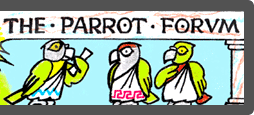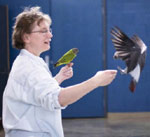I have two African greys. One is subspecies Timneh (TAG) and the other is a red-tail grey, commonly referred to as Congos or CAG's.
Both of mine are hens and both are mature (over the age of 10). I do see differences between greys and other species of birds. It might be difficult to articulate so I thought I'd try and see if others would like to add to this conversation.
Training and husbandry have a HUGE impact on greys; however, to understand the birds, it is also helpful to understand as much as we can about how they would be living in the wild. I don't know if many studies have been done but there are a few things that we do know about wild greys. First, they are a flock species. Not every parrot species lives in flocks, but greys forage and fly in huge flocks. They also will forage as a flock on the ground. To a flock species, isolation can be risky and even mean death so I believe that greys are incredibly in tune to what is going on in their "flock". They tend to pay a great deal of attention to nonverbal signals as well as to the ambient noises in a household. Africa can be a tough place to survive with periods of rain and drought and many, many predators. Only 19 species of parrots are on the African continent compared to South America and Australia which have many, many more species. African birds have evolved to survive in that environment and probably have superior adaptation mechanisms and that means that they are very tuned in to what happens in their flock.
I have flown and watched others fly a few greys in our fly building and those that have the ability, will often fly high and fly far. For this reason, it is not an easy thing to free fly an older grey. My guess is that in the wild, they would be flying high and up in a flock and that flock would help them navigate but if they are flying solo.....they aren't getting a whole lot of help navigating so they can and often do, fly too far to know how to get back. A lot of young greys are lost. If you have a fully flighted young grey, you need to be extra vigilant that they do not get outside without a long history of proper training because they will fly up and they often do not come down close enough to be found. Greys are highly desirable companions so I think a lot of them are simply found and kept by the people who find them.
It is possible to train many behaviors, but greys have a different type of intelligence than most other species of parrots. They have a high degree of language ability. They can and do speak in context and while not all greys will be good talkers, many talk in long phrases and sentences - almost a stream of consciousness discussion. They are also master manipulators. The task for any body who owns a grey is to teach them how to manipulate you using behaviors that you find DESIRABLE and letting the behaviors that you do not want, extinguish. This will be an important task throughout the bird's lifetime. Like any species of parrots, greys change and adapt as they mature and as their life circumstances change.
Communication is key. Greys look to the flock for communication signals. For this reason, it makes good sense to tell them what you are going to do before you do it. If the bird is prepared, they will be more willing to partner with you. Security is also very important. Greys are cautious birds by nature so they need to know and trust that you play the role of the "sentry bird". The sentry bird is the one that watches and alerts the flock of dangers. If the grey understands that you are the one that will watch and prevent danger, that grey will trust you.
For a fun book on grey parrots that was written in 1987 (and has a lot of dated information) I recommend "The Grey Parrot" by Wolfgang de Grahl.
What I find when training my greys, is that they often focus as much on ambient noises as they do on me. I don't have this problem with the Senegals who are almost always very focused on me. I believe this is probably a difference in how greys are hardwired. If you consider what it must be like to fly in a flock, the birds need to be able to twist and turn quickly and they need to be aware of what is going on at a bodily level. Birds do see much differently than we do. They actually see much more than we do because they can see at both ultraviolet spectrums and they can see across a horizon. They can also focus on several things at one time and we cannot do that. I think that greys pay as much attention to the ambient environment as they do to us and that can be a training challenge. As a trainer, you have to trust that your bird is processing more than you are and look to that as part of the communication or feedback loop.
The challenge with greys is finding what is reinforcing to them. Mine are all good eaters and fortunately, are very reinforced by treats however; not as consistently as my Senegals. I think that greys often study what is going on and will often "stop and stare". When doing tricks, I refer to this as the "stare like a statue" trick as a joke. This is not a deficiency. This just means that the bird is processing every thing around them and once this is done, you will be able to go back to normal training.
What else is reinforcing to a grey? Play behaviors are reinforcing. Most confident young greys play very rough, hanging upside down and screaming. This is very normal and it shows that you have an adjusted, happy, confident grey. The flock is reinforcing. As caretakers, we are part of their flock and we do become very important to the mental well being of our greys.
Others may disagree, but I raised my grey much as I would a child. I took her around the house and showed her objects and named them. I always named her food before I fed it to her. For the first year, I did not leave her alone. I travelled with her. She did spend a lot of time alone in her cage because I have always worked a full time job out of the house, but I made sure she had toys and foraging objects to occupy herself. Phinney is 13 years old right now and she has an extensive vocabulary today and often speaks in context. In addition to that, I have been taking her to retirement homes for many, many years. She qualified as a Delta Society Pet Partner a few years ago (along with the dogs). She has also been on TV a few times. She has a repertoire of about 8-9 prop tricks and is a really wonderful companion.
The discussion of greys is a very complicated subject. All greys are different individuals. Books can and have been written about these wonderful companions. So, what do you have to add to this? What do you think is different about greys from other species? There are a lot of myths out there about greys so it would be interesting to see what different people observe.
Thanks!



How are greys different from other species?
2 posts • Page 1 of 1
How are greys different from other species?
Mona in Seattle
Phinneous Fowl (aka Phinney) TAG
Babylon Sengal
Doug (spousal unit)
Jack and Bailey (Gremlins)
Kiri (CAG)
http://www.flyingparrotsinside.com
youtube: Avian Flyers
Phinneous Fowl (aka Phinney) TAG
Babylon Sengal
Doug (spousal unit)
Jack and Bailey (Gremlins)
Kiri (CAG)
http://www.flyingparrotsinside.com
youtube: Avian Flyers
-

Mona - Poicephalus
- Gender:

- Posts: 271
- Number of Birds Owned: 5
- Types of Birds Owned: Senegal Parrots, Congo African Grey, Timneh African Grey
- Flight: Yes
Re: How are greys different from other species?
I've read a lot about greys nothing as wonderful and profound as this.
My grey seems to become each member of my family,in his voice gestures ect.
He sleeps in my room not in his cage on a suspended perch, each morning as he wakes us up he recites every word and noise he knows to wake us up.
I'm am a mother 2 a 3 year old girl,I'm sure he tells her to open his cage.I often catch her in the act.
My grey seems to become each member of my family,in his voice gestures ect.
He sleeps in my room not in his cage on a suspended perch, each morning as he wakes us up he recites every word and noise he knows to wake us up.
I'm am a mother 2 a 3 year old girl,I'm sure he tells her to open his cage.I often catch her in the act.
-

mac - Parrotlet
- Gender:

- Posts: 16
- Location: montreal
- Number of Birds Owned: 9
- Types of Birds Owned: african grey,crimson bellied conure,green cheeked conure,parotlet,love birds
- Flight: Yes
2 posts • Page 1 of 1
Who is online
Users browsing this forum: Google Adsense [Bot] and 18 guests
